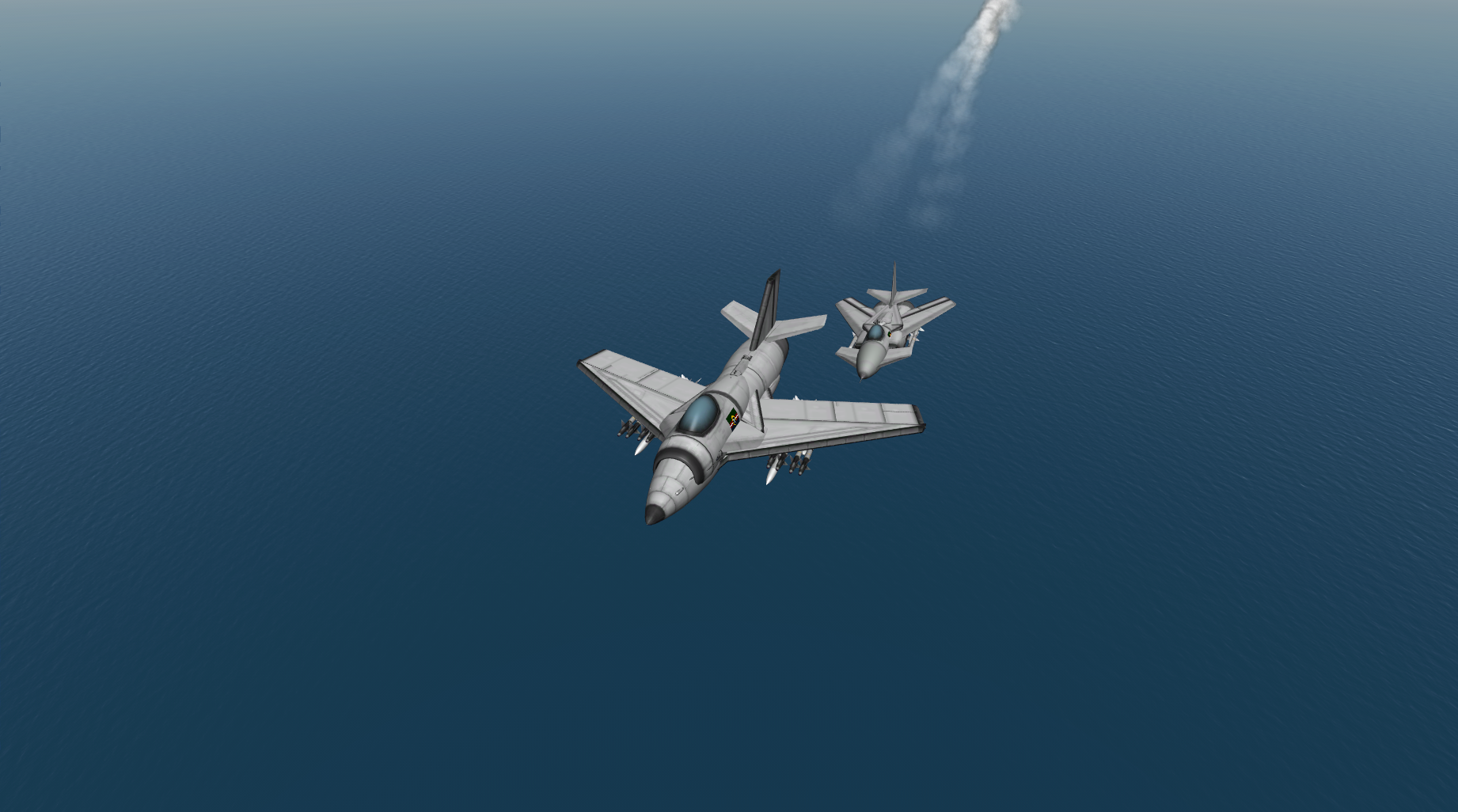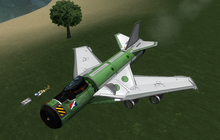YaV-5 Spooky
|
YaV-5 Spooky
|
|||||
|---|---|---|---|---|---|
 |
|||||
| Role | Multirole Air Supremacy (YaV-5ZBis) | ||||
| National Origin | Arcadia | ||||
| Production History | |||||
| Service History | |||||
| Used By | Arcadian Aerial Forces Ravniny Union Air Force (former) Eradican Air Force (former) Sarconian Air Force (former) |
||||
The Yakovich-Vladimirov Spooky is a family of 1st, 2nd, 3rd, and 4th generation fighters. It is a single seat, single engine, all weather swept wing aircraft first designed in the early 1950s as a cheap air superiority fighter. It is next to unmatched in a turn fight due to its unique air-frame design which has made it a valuable asset even to present day.
Development
After jet power had been discovered during the mid 1940s the Union of Arcadian Socialist Republics had been hoping to acquire this technology and upgrade their airforce at the closing stages of the Cookie War in 1947. After recovering experimental prototype fighters fielded by the Baskay Coalition in 1949 development had begun to create a jet fighter that would fit the role for air superiority. The first prototype of the Spooky was the YaV design 361, she featured a nose intake, the iconic swept wing design that has distinguished the Spooky from its competition, a single turbofan allowing it controlled supersonic flight in dives, as well as rails for the first experimental missiles. During the test flight the pilot had lost control in a dive due to mach effect and crashed into the ground, The aces callsign was "Spooky Red", hence where the name had come from. YaV design 362 had featured an all moving tail, new hydraulics, an ejection system, as well as slightly improved engine. During the test flight it had broken Mach 1.13 in a dive and retained control to pull out of the dive, causing the pilot to black out temporarily. When landed YaV officials had placed an order for 10 more test beds, designated YaV-5A "Spooky".
Variants
YaV-5A
After its introduction in November 1959, the "Ten Bastards" as they were called were rushed off the production lines for more standard testing, as well as being placed in the Arcovy Defense Wing. In March of 1960, after several more tests, an order for 150 of the aircraft was placed. The order was finished in May of 1962, making it the most numerous fighter of the period in the Arcadian Aerial Forces. Another order was placed in January of 1965 for an additional 250 aircraft, and was finished in late 1968 giving the aircraft a total production run of 400 units total. Seven YaV-5As were gifted to the Arkadii satellite Sarconia in 1965. In the 1972 Sanctum War the aircraft scored a kill to death ratio of 8:1 making it the best aircraft for aircraft dogfighter at the time. Production continued until 1973 with the introduction of the Spooky B.
YaV-5B
With the introduction of afterburning jet engines to the global stage in the mid 1960s the aging Spooky encountered issues in high-G turn fights as it couldn't accelerate out of turns leaving it slower than the competition. Development had begun in 1967 to update the YaV-5As airframe as the aircraft could rip itself apart during high speed maneuvering. The YaV-5B was first test flown in 1971, featuring a shorter fuselage, a redesigned wing, and a thrust vectoring afterburner. During preliminary testing the aircraft had broken the sound barrier in level flight reaching Mach 1.27 at an altitude of 4km. It was outfitted with the newest version of the 20mm Autocannon that had originally adorned the aircraft, as well as updated missile rails for new, and future missile designs. Production began at the closing of the Arcadian Sanctum war in August 1972, with an order from the Arcadian Aerial Forces to entirely replace the aging A model. The production of the 400 aircraft was hurriedly completed in late 1975. After the completion of the 400 new aircraft the AAF had placed an additional order of 100 jets, however due to corporate issues and government unrest the order was uncompleted with only 37 being delivered. During the Great Decline the majority of YaV-5Bs were either torched, or crashed by inexperienced pilots. The remainder of the YaV-5 engineering teams had made a goal to preserve the technical data as well as a handful of aircraft and had stolen the 9 remaining B models and hid them in storage sheds around Arcadia in hopes of finding use for them one day.
YaV-5B-2
During the Arcadian Revolution of 2053 the three YaV-5B Spookys were dug out of there sheds as trainer aircraft for the communist pilots of the fledgling Arcadian Aerial Forces, being re-designated the YaV-5B-2. The remaining six Spookys were not discovered until after the war. With technical drawings being discovered with the second Spooky, many design aspects were put into the new fighters while the Spooky had become a museum piece in the Air Museum of Arcovy, while production runs were occasional between 2053-2068. During January 2068, the AAF had placed an order for 200 YaV-5B-2s as tensions had begun mounting between the remaining Arcadians and Zokesians, eventually culminating into the Arkadii-Zokesian War in 2073. The Spookys had secured Air Superiority temporarily, though being severely outnumbered, however the government had collapsed immediately after the air war. Roughly seven aircraft were recovered by the Zokesian forces, however the technical drawings were hidden again by YaV engineers.
YaV-5C
After the formation of the Arkadii-Zokesian Federation in 2083, the recovered YaV-5B-2s were transferred back to Yakovich-Vladimirov, who had saved the technical drawings at the end of 2073. The design hit the drawing board again almost 124 years after entering service and had its first major redesign in nearly 30 years. The cockpit was moved up roughly 50cm, it was given an aerodynamic conical nose, the radar was massively upgraded, the fuel load was doubled, armament capability was upgraded from 2 hardpoints to 6. The first order was received by Yakovich-Vladimirov on February 2083 for 150 Aircraft to the AAF. After the first batch of 10 they were combat tested with the Ly-79C against the Z-80H and Z-35Bs, proving extremely effective against the competition.


